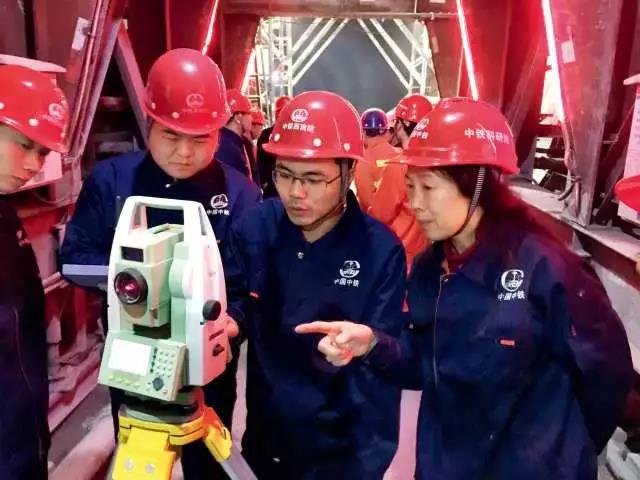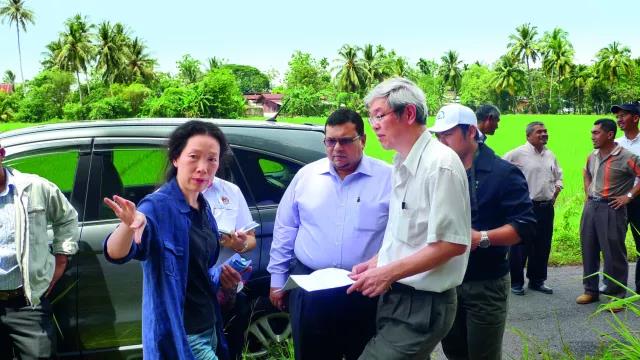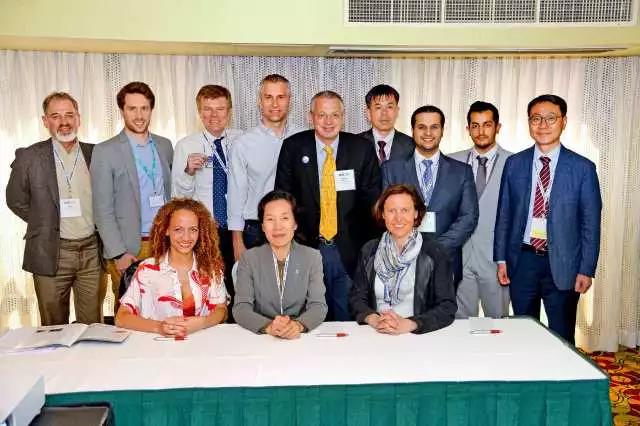


Yan Jinxiu (R) and her colleagues
Yan Jinxiu, deputy general manager of China Railway Academy (CRA), is one of the few women experts in China's tunnel-construction sector. Yan has worked in the industry for 33 years, during which she has not only realized her value as an executive, but she has also helped China's tunnel-construction technologies evolve into world-class technologies.
Early Years
Yan in 1984 began working as a researcher at the China Railway Southwest Institute (CRSI), after she graduated from Chengdu University of Technology. The construction of the Dayao Mountain Tunnel was the first big project on which she participated.
Tunnel-construction technology advanced rapidly in China during the 1980s. Chinese improved the technologies used to construct long tunnels. As a result, Chinese took less time than previous to construct tunnels. Tunnel construction was mechanized in China, and Chinese could construct tunnels through mountains that had bad geological conditions.
Dayao Mountain Tunnel, at 14.295 kilometers, was the longest tunnel in China in the 1980s. Construction of that tunnel was the beginning of the modernization of the tunnel-construction technology in China. Many industry experts participated in the tunnel's construction. A scientific-research team was established to discuss the tunnel-construction technologies.
"At that time, I was assigned to the construction site of Dayao Mountain Tunnel. It was a valuable experience for me. I gained a better understanding of the level of tunnel construction in China. I also came to understand how dangerous it was to construct a tunnel," recalls Yan.
As a tunnel-construction expert, Wang Jianyu, then-president at CRSI, participated in the tunnel's construction. "Yan is a persistent, diligent person. No matter how difficult a thing is, she insists on doing it, if it is good for our country. She told me she hoped to study scientific and technological information involved with tunnel construction. She believed Chinese experts should import new technologies for tunnel construction from foreign countries," recalls Wang.
Yan has since studied the tunnel-construction technologies in China and abroad, the technologies used to construct long, large and complicated mountain tunnels, the technologies used to construct subsea tunnels, risk management of the tunnels and water-prevention and drainage technologies. She has taken charge of several scientific research projects at the provincial and ministerial levels.
Yan's research into the risk assessment and risk control of Yesanguan Tunnel was the first project in China that was about the risk management of a railway tunnel. Her research into the system and structure of water prevention and drainage, and into construction-quality control, of Qingdao-Jiaozhou Bay Subsea Tunnel played an important role in improving the performance and quality of the system of water prevention and drainage of the subsea tunnel.
Yan has received many awards over the years. She won the special prize, first prize and the second prize for progress in science and technology awarded by China Railway Society. She was named a scientific and technological top-notch talent by the Ministry of Railways (the ministry was abolished in 2013). She was named a red-banner holder by the All-China Women's Federation in March of 2017.
International Stage
Yan learned the advanced, tunnel-construction technologies introduced to China by other countries in the 1980s and 1990s. Yan's good command of English helped her a lot. At that time, when she conducted tunnel-construction research, she learned about the related foreign technologies and how foreign experts solved similar problems. She even invited experts from Germany and Austria to study the tunnel-construction technologies of the Qingdao-Jiaozhou Bay Subsea Tunnel.

Yan Jinxiu reports to clients the findings of the investigation into a project in Malaysia.
In 1990, the annual meeting of the International Tunnelling and Underground Space Association (ITA) was held in China for the first time. Yan worked as a translator during the meeting. She used that opportunity to become acquainted with many foreign experts. She came to understand that China's tunnel-construction technology lagged behind the world's advanced technology. So, she set the goal of improving China's tunnel-construction technology to the world-class level.
Yan became a member of ITA in 1999. Since then, she has participated in many international academic meetings on behalf of China. She has achieved great success in the tunnel-construction industry throughout the years, and she has gained wide attention in the world.

Yan Jinxiu accepts a certificate, presented by president of Korean Tunnelling and Underground Space Association.
Yan was elected a member of ITA's executive committee during the 39th ITA-AITES General Assembly in May 2013. That meeting was held in Geneva, Switzerland. As an expert of the technical committee of the World Tunnel Congress, she is responsible for selecting academic theses for the congress, and for hosting the technical meetings. As one of ITA's training experts in tunneling, she gives lessons during international training sessions hosted by ITA.
Yan gave lectures on behalf of ITA during 10 international meetings, which were held in Europe, South America, the Middle East and Southeast Asia. She has helped to promote China Railway Academy (CRA) to the world, and she has helped to expand the influence of China's tunnel-construction technology.
Expanding Overseas Market
As CRA's deputy general manager, Yan is responsible for the academy's overseas work. In 2014, she organized the academy's bid for a water-tunnel-construction project in Malaysia, and CRA won the bid. The CRA won the bid for an overseas project for the first time. In 2015, she led her team in studying the feasibility of constructing the subsea tunnel in Malaysia, and she led the team in the preliminary design of that tunnel. In 2016, she organized the academy's bid to monitor the second stage of the metro construction in Kuala Lumpur, and CRA also won the bid.
The CRA over the years has won bids to design, monitor, detect and/or construct six tunnels in either Malaysia or Laos. The company's profit from overseas projects in 2016 was 143 million yuan (US $21 million). The profit in 2015 was only 8.25 million yuan (US $1.2 million).
"It is not easy to win a bid for an overseas project. I have encountered many difficulties … Every country has its own conditions ... We need to collect and analyze many documents ... The development of a project is a long process ... We need to work with perseverance. If we implement an overseas project in the 'Chinese' way, foreign clients will not accept us … Many foreigners do not know much about the development of China's tunnel-construction technology. At the beginning, some foreigners will not trust me. They worry about whether a woman can do the work well," says Yan.
"I remember the clients did not trust me, after I began to develop the management of the project in Malaysia, as I was a woman. They were convinced by our advanced technology and dedicated attitude, after they had dealings with me for a long time," Yan continues.
Going Out
"Few women work in the tunnel-construction industry. If I participate in a tunnel-construction meeting, I will find out that nearly all of the participants are men. Women are not allowed to enter the construction site of some tunnels. I participated in an international tunnel-construction seminar held in Qingdao, a city in eastern China's Shandong Province, earlier this year. I guided some foreign experts to visit a local tunnel-construction project. At the beginning, the client did not allow me to enter the tunnel, because of my gender. I could enter the tunnel after I communicated with the client for a long time," says Yan.

Yan Jinxiu (middle) and her colleagues at ITA
"I spend much time and energy on my work. I often work overtime. I am accustomed to carrying the laptop and dealing with work at any time. My husband and family members all support me. They never complain to me, even though I spend most of my time on my work. I could not achieve so much success without my family members," says Yan.
Yan was elected vice-president of ITA's executive committee during ITA's 42nd general assembly in April 2016. Since then, Yan has set new goals; she hopes China will become a powerful country in the tunnel-construction sector, and she hopes China will improve its influence in the world.

Yan Jinxiu provides instruction during an international tunnel-technology session hosted by ITA.
"Now, the overall length of highway and railway tunnels in China exceeds 20,000 kilometers. China's advanced technologies and experiences … should be summarized and promoted to the world, which will help China become a powerful country in the field of tunnel construction. I will promote China's technologies and achievements to the world, when I have the opportunity to communicate with foreign experts or when I participate in international meetings," Yan says.
"I hope more tunnel-construction researchers will participate in more international meetings and cooperate with foreign experts. They will not only learn the advanced, foreign technologies and experiences, but also they will promote China's technologies to the world. I believe our tunnel-construction technologies will go out to the world, only if we all take action," she concludes.

 Award-winning photos show poverty reduction achievements in NE China's Jilin province
Award-winning photos show poverty reduction achievements in NE China's Jilin province People dance to greet advent of New Year in Ameiqituo Town, Guizhou
People dance to greet advent of New Year in Ameiqituo Town, Guizhou Fire brigade in Shanghai holds group wedding
Fire brigade in Shanghai holds group wedding Tourists enjoy ice sculptures in Datan Town, north China
Tourists enjoy ice sculptures in Datan Town, north China Sunset scenery of Dayan Pagoda in Xi'an
Sunset scenery of Dayan Pagoda in Xi'an Tourists have fun at scenic spot in Nanlong Town, NW China
Tourists have fun at scenic spot in Nanlong Town, NW China Harbin attracts tourists by making best use of ice in winter
Harbin attracts tourists by making best use of ice in winter In pics: FIS Alpine Ski Women's World Cup Slalom
In pics: FIS Alpine Ski Women's World Cup Slalom Black-necked cranes rest at reservoir in Lhunzhub County, Lhasa
Black-necked cranes rest at reservoir in Lhunzhub County, Lhasa China's FAST telescope will be available to foreign scientists in April
China's FAST telescope will be available to foreign scientists in April